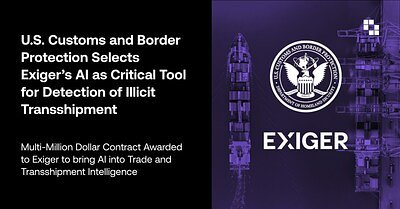
AI-Powered Supply Chain Security: CBP Taps Exiger to Combat Illicit Trade
U.S. Customs and Border Protection is deploying AI to fight trade fraud with a new contract awarded to Exiger, highlighting a growing trend in supply chain risk management. The partnership aims to detect hidden origins and boost tariff revenue.
AI-Powered Supply Chain Security: CBP Taps Exiger to Combat Illicit Trade
NEW YORK, NY – October 28, 2025
Closing the Net on Trade Fraud
The U.S. Customs and Border Protection (CBP) is stepping up its fight against illicit transshipment – the practice of disguising a product’s origin to evade tariffs and trade restrictions – with a new partnership centered around artificial intelligence. CBP recently awarded a multi-million dollar contract to Exiger, a leading provider of supply chain risk management solutions, to deploy its Trade AI platform. This collaboration represents a significant investment in proactive enforcement and signals a growing trend toward data-driven solutions for securing global supply chains.
Illicit transshipment poses a considerable threat to American businesses and the integrity of the trade system. By concealing the true origin of goods, companies can avoid paying legally mandated tariffs, circumvent trade restrictions imposed for national security or human rights reasons, and gain an unfair competitive advantage. “The scale of this problem is substantial, with billions of dollars in goods flowing through illegal channels,” noted one trade policy analyst. “Current methods of detection are often reactive and rely heavily on manual inspections, which are simply insufficient to address the volume and complexity of modern supply chains.”
AI as a Force Multiplier
Exiger’s Trade AI platform leverages machine learning and advanced analytics to identify patterns and anomalies that indicate potential illicit activity. The platform ingests vast amounts of supply chain data, including bills of materials, shipment records, and supplier information, to create a comprehensive risk profile for each transaction. This allows CBP to prioritize inspections, focus resources on high-risk shipments, and detect hidden origins with greater accuracy.
According to Exiger, the platform automates the verification of tariff classifications, values, and countries of origin. It also generates bills of material, tracks raw material movement, and assigns real-time risk scores to shipments. The technology can potentially expedite tariff revenue collection and significantly improve visibility into complex supply chains. “This isn't just about catching bad actors; it’s about creating a more transparent and resilient trade system,” explained a supply chain expert familiar with the platform. “By automating many of the manual processes involved in trade compliance, CBP can free up its officers to focus on more strategic tasks.”
A Competitive Landscape in Supply Chain Security
The deployment of AI in supply chain security isn't unique to CBP and Exiger. A growing number of companies are offering AI-powered solutions for risk management, highlighting the increasing importance of this technology. Resilinc, another key player in the market, has also emerged as a leader in the field. Other companies, like Prevalent, are offering comprehensive solutions that address a wide range of supply chain risks. The recent GSA SCRIPTS BPA award, a 10-year, $919 million contract, underscores the federal government’s commitment to investing in advanced supply chain risk management technologies. Exiger was named the highest-ranked unrestricted vendor in that competition.
“The market is becoming increasingly competitive, with vendors constantly innovating and adding new features,” said one industry analyst. “The key differentiator is the ability to ingest and analyze vast amounts of data, identify meaningful patterns, and provide actionable insights. Companies that can do this effectively will be well-positioned to succeed.”
Beyond Tariffs: Addressing Ethical Concerns
The use of AI in supply chain security extends beyond tariff evasion and trade restrictions. It also has the potential to address critical ethical concerns, such as forced labor and human rights abuses. Exiger’s research indicates a significant connection between trade fraud and forced labor practices, particularly in industries like textiles, apparel, and renewable energy. The company's platform can help identify shipments originating from regions known for labor exploitation, enabling CBP to take appropriate action.
“Companies are under increasing pressure to ensure that their supply chains are free from forced labor,” explained a compliance officer at a major retailer. “AI can play a vital role in identifying and mitigating these risks, helping to protect vulnerable workers and uphold ethical sourcing standards.” By leveraging AI to enhance supply chain visibility and risk assessment, CBP and its partners can work towards a more responsible and sustainable global trade system.
